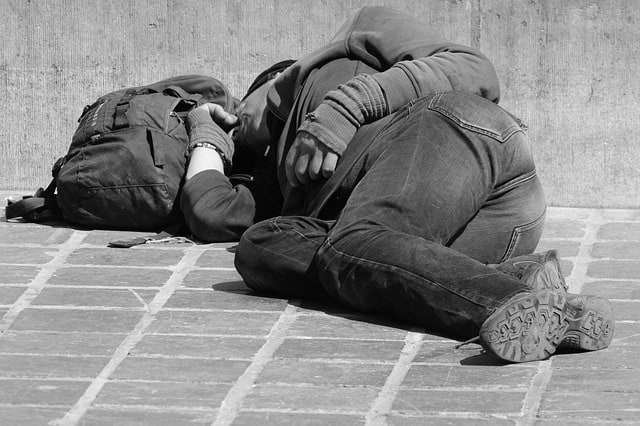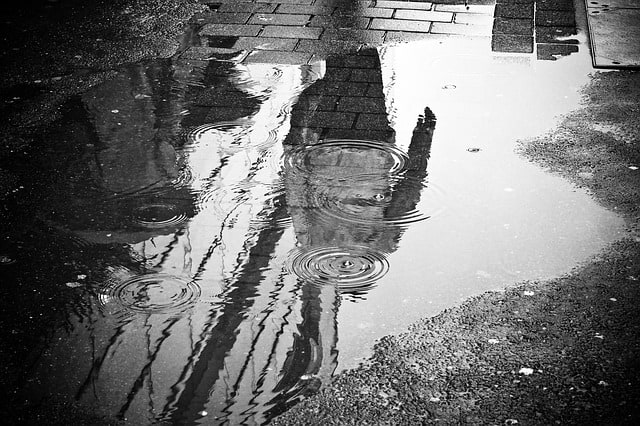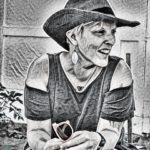What I Remember from 5th & San Pedro
– Fierce Fiction by Elly Revilla-Kugler – August 21, 2018
The place I saw you. How you were walking, squinting, through the slowly-becoming-blinding dawn light. How you carried a large red and white tote bag. How you carried a dingy green army pack. How you carried a small purse printed with big pink lipstick kisses. How you were walking towards me.
 How I stayed on my bedroll and pretended to be asleep and watched you walk by. I had seen you wander by many times. People who live here see each other, we notice each other, we are neighbors like anyone else is neighbors – some making pacts or alliances, others keeping to themselves. I keep to myself, but I watch.
How I stayed on my bedroll and pretended to be asleep and watched you walk by. I had seen you wander by many times. People who live here see each other, we notice each other, we are neighbors like anyone else is neighbors – some making pacts or alliances, others keeping to themselves. I keep to myself, but I watch.
You had never stopped near me before. I watched you to see how close you would come. You came close, stopped all of a sudden, stood there as the dawn cast light over more and more of your face and body, rocked back and forth on the balls of your feet. You started talking and eventually I couldn’t pretend to be asleep so I sat up. You talked and talked to me for half and hour straight. I said nothing but watched and listened from the shadows of my roll. You said I smelled too bad to come any closer. You didn’t act like you wanted to be insulting, you just stated a fact.
You talked and talked and then you stopped, told me your name, asked mine, said “all right then” and walked off. Good morning to you too.
The way you wandered. The way you moved from one street corner to another. How you walked with your unpredictable, flapping purpose – someone on the go, someone with a mission. How you always seemed aimless once you arrived. Your conversations. How they drifted. Your eye contact, and the way it wandered too, over and past one shoulder of whoever you were talking to. The way you came and visited more often, or maybe ended up by accident standing at my bedroll, hands shaky-gesturing. Voice rising and excited. Story complicated and hard to follow, so I listened just to the sound of your voice, the way being outside and smoking can sand down the vocal chords.
How you showed up unexpectedly, in the early morning before the soup kitchens opened or in the stinking heat of mid-day or late at night when I was already bedded down. How you might stay for two minutes or eight hours. The heavy fullness of you, the shift of your weight from toes to heels. You, moving like an exclamation mark, riled up by the events of each day, the excitement of new things and everything was new and changing for you, even my front porch view was constantly changing as cars drove by from early morning to late night. Toyota trucks early in the morning, SUVs in the day, BMW’s in the early evening, Cadillacs late at night. You noticed these things, and pointed them out, and I noticed too. I had stayed in the same place for years – people knew better than to try to take my spot. I left for street cleanings, and to go get food down the block, and once or twice when I got picked up, but I always came back and did not like to leave. I had not noticed the things you noticed until you started to point them out.
And you stood over me talking, and I would nod sometimes or shake my head. How I did not know how to have a friendly conversation with you and had to pretend a little because I didn’t want to yell at you so you would not come back. How it was hard not to yell at you sometimes, how when you showed up, talking talking talking, I wanted to send you packing.
The roundness of you, that heavy rolling fullness. The way you shuffled your feet in your pink sneakers. How I started to noticed that you always wore pink. The way you swayed from side to side when you were trying to hold still.
How when you were being very honest you looked like a liar. You closed your eyes and spoke too loudly. How when you were lying you were so easy to see through. No poker-player’s tell, just stories that couldn’t be. Stories anyone would want to be true, of winning the lottery. Stories anyone would pity – government conspiring to watch you, to take all of your things. How you started to come to my bedroll more, standing over me and blocking out the light, to tell me all these stories. How I listened. I had not had anyone talk to me much, not more than “here is your soup”, “sit over there”, “God bless you.” Not for a long time.
 The stories you told me, the ones I figured for halfway real, the ones that only came out in small fragments, comments on some other topic: The small hot town you were born in, out where the railroad ran by but did not stop, where you would run next to the train and wave and wait for someone to wave back. How few people did. How you were thrilled, thrilled, each and every time. The way the roof leaked in your childhood home, the way the refinery sat just a block away. The way the air was always thick with something – white smoke, mosquitos, wet heat.
The stories you told me, the ones I figured for halfway real, the ones that only came out in small fragments, comments on some other topic: The small hot town you were born in, out where the railroad ran by but did not stop, where you would run next to the train and wave and wait for someone to wave back. How few people did. How you were thrilled, thrilled, each and every time. The way the roof leaked in your childhood home, the way the refinery sat just a block away. The way the air was always thick with something – white smoke, mosquitos, wet heat.
How your tired parents told you to shut up when you cried. How you cried anyway and still didn’t get fed. How you still feel hungry, thinking about it now, how you always feel a little hungry. How you were skinny then and small, but never since. The smell of wetness, everywhere, the stink of marshland and burning plastic. And then your flight: a neat and birdlike woman who carried you away. Who made home just a memory of voices and charred smell and the wet smoke everywhere, a dwindling pinprick. Your years of travel through the places they send those who are loud and wild and smell of smoke: Cleaned-up hospital. Cleaned-up court. You, bottled up there, too loud and too broken apart and too broad in shoulder for these places. Unable to stay still.
More likely-real stories: How you passed through truck stop, train station, bus stop, public restroom. How we all do things to get by. How you would never panhandle when you still had some money left, because you felt like it wasn’t honest. How you would get stuck places when you were too upset, too lost and confused. How few people would feel sorry for you or help you out when you asked. You laughed at these stories, you told them as jokes. I did not laugh.
How you wandered, Midwest to Eastern Seaboard to West but never the South, never again. How you lived on the edges of highways and empty spaces. The hard feel of big gravel rocks on your back, cement pylons, being half-undressed in outdoor places and in the cabs of many trucks. You laughed telling me those stories too but you looked at me sideways to see if I minded. I minded, but not because of you. I minded thinking of people taking advantage of you, I minded that these didn’t sound like fair trades. I tried to say this and you stopped talking for a minute and listened, your head cocked to one side, your eyes so far away.
How I sometimes talked, faltering, when you pushed me, towering over me and repeating a question over and over until I could do nothing but answer. Or sometimes as the sun was going down, it felt like campfire time – a time when my voice wasn’t my own creaking voice. My voice felt foreign to use, it had been so long since I spoke about anything except bare-bones survival. But as darkness lapped over us, weakened by the many streetlights, I could speak in a voice almost not my own and tell memories I had nearly forgotten. How I told you an old memory, of the two parents I was born to, and how good their home sometime smelled. How for a moment with you standing by me at the place I always slept, I remembered their faces.
How you carried a sharp piece of metal wrapped in a sock in a side pocket of your pink coat and said everyone knew better than to mess with you. How you always shared with people who were halfway decent to you. How you were often taken advantage of. The way you trusted people still, anyway, despite it all. How many friends came to talk to you on the fifth of the month, when your disability check came in. How you called it a little loan, a friendly loaner, each and every time, even though nothing would be repaid.
How you always felt you were mostly doing a good job with people because they kept coming back. How that began to bother me.
How I packed up my bedroll for a little while and slung my backpack on. I left my block, went far from my spot to have a talk with a few of the people who kept getting loans from you. I reminded them where I had been, and I reminded them I still knew my business, the only steady work I ever really knew, which was to harm. No bayonet needed, no rifle or assault weapon or knife or anything. And it so happened that these so-called friends of yours stopped asking for loans so much. You came over more. I didn’t mean for that to happen.
How you looked in the blinding dawn sun when I was still on the sidewalk in my lean-to and you stood above me: The prominence of your nose and forehead. The slump of your hair, not too proud or fancy but brushed nicely and tied back into a ponytail. How I had to crane my neck to see you, talking, standing arm’s length away. You in your thickest sweatshirt and me in my long johns and flannels, lighter bedroll discarded for wool. The cold season coming on.
I never asked you for anything. Not even when I was hungry, not even when I needed socks or Tylenol. I waited in line and I tried to get something extra, an orange, in case you stopped by.
How I started to wait for you, how I would wait each day to see if you would stop by. How I rolled my bedroll tighter and neater, more like the way I had once been trained. How I started to wait in line for two hours to get to use the shower every other day. The weather started to get colder – fall moving to winter. How I waited in line to get cleaner clothing. How I embarrassed myself getting a women’s sweater, even after the shelter volunteer said loudly, “But that’s a woman’s sweater.” How I took it anyway. How I did not lose my temper with the shelter volunteer. How I gave the sweater to you when you came by. How you looked at me and you did not talk for a second, one Mississippi, two Mississippi, three, four. And then you told me a story about how you once travelled on a riverboat, and I listened and listened.
How it was harder and harder to see you because you came a little closer each time. I was always in the same place, people knew not to mess with my spot where I slept. But you kept coming closer – my porch. My front steps. And me – how I felt an ache low in my belly – not hunger or the pain in my bones but something new. How this feeling grew slow and wide and warm.
 How shiny the road was after the rain came gushing down for the first time during rainy season. How so many people were cold and sodden, with wet sleeping rolls. It was always hard for all the new people who didn’t plan, and for the people who couldn’t remember that rain would happen. How everyone’s space got jumbled during rain, with everyone huddled up in places where they might not get wet. You had gotten a box of garbage bags and wrapped your whole tent. How well-dressed people going to the bars near your corner laughed at you as you muttered and worried. But your bedding was dry.
How shiny the road was after the rain came gushing down for the first time during rainy season. How so many people were cold and sodden, with wet sleeping rolls. It was always hard for all the new people who didn’t plan, and for the people who couldn’t remember that rain would happen. How everyone’s space got jumbled during rain, with everyone huddled up in places where they might not get wet. You had gotten a box of garbage bags and wrapped your whole tent. How well-dressed people going to the bars near your corner laughed at you as you muttered and worried. But your bedding was dry.
And then how you had your tent closer to a new person during that rain. How you heard the new person and they were cold and they were crying. How they told you they were missing their little girl who was somewhere far away. How you grabbed their shaking hand and knew it was too cold. How you told them they couldn’t sleep like that. How you gave your tent away, and your bedding, maybe a little loan, maybe to keep, left the crying woman tucked in and getting warm. How you grabbed your two bags and headed out, how you left your home behind without a single doubt.
How you showed up and woke me as I slept in my dry, warm bedding. How I was secure and mostly warm and tucked under an overhang with no incline so no dirty water flowed towards me – a perfect place. The water slamming down almost beautiful. How you said you were staying at my place that night.
How the next morning I got picked up while crossing the street to get us both stale muffins from the church people. How I spent days in County, every echo and the movement of every stranger fell like it was clawed across my back – normal, the same it felt anytime I had to be around too many strangers and the way it feels to be in a cage.
But how there was something different too: how I still ached, gentle and quiet. How I ached because you were not there. How this did not hurt like other hurts – how it quieted those other hurts, a little, and let me listen to something new in myself. How I hurt no one. How I did not get hurt. How I did not get lost in the wild echo of humans voices bright light antiseptic smell. How there was something different that kept me still, the memory of how it felt to listen to your stories, the scraping memory of talking to you.
When the big Sheriff’s bus dropped me off outside the Rescue Mission, how I hurried to my spot that was now our spot. How I couldn’t find you. How I looked. How I talked to strangers, asking and asking. How I wandered, far from where I or you had ever stayed. How everyone had seen you but no one knew where you were. How I ended up slumped in a bus stop that night, in the thin shirt and shorts I’d worn to go get us breakfast, my tent gone, rain falling in thick sheets. How I kept going back to my spot, how I kept searching. How I waited – one day. Two days.
How you appeared on the third day, your pink bag and my tent neatly packed in a rolling cart. How you rocked on the balls of your feet when you saw me and I saw you too. How you came to me – slow. How I walked to you – slow too. How we stood, so close, but not yet touching. How we were both quiet. How it felt – this bellyache wistful. This cool sweet tickle. This softness. The wet unzipping sound of a pink tent. The orange I had saved for you. The quiet rasp of your voice, in the night, talking to me, you on your sleeping bag and me on mine, staring up at the tent ceiling. This shared tent. This ache.
 About the Author – Elly Revilla-Kugler
About the Author – Elly Revilla-Kugler
Elly Revilla-Kugler lives in Maryland. They have been writing since they were three; have lived on all four coasts of the U.S., if you count proximity to the Great Lakes as a coast; and have worked as a community organizer, grant writer, interpreter, substitute preschool teacher, and washer of dishes. They also make excellent mixes: https://8tracks.com/musicachingon. They spent several years working in the Skid Row neighborhood of Los Angeles, California—the neighborhood where this story is based. This story is fiction.
* “What I Remember from 5th & San Pedro” was originally published in Little Patuxent Review.
Did you like this story by Elly Revilla-Kugler? Read more fierce fiction, like:
Incomplete Woman
The Window
Someone to Watch My Back
Moon Window